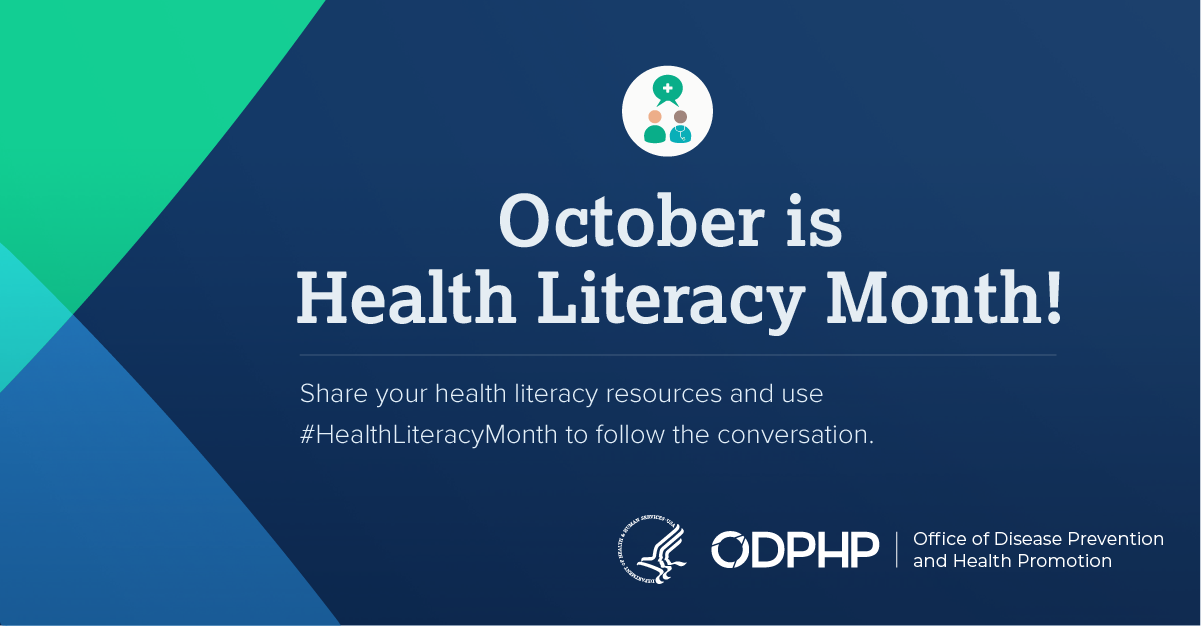Every October, we celebrate Health Literacy Month — a time to recognize the importance of making health information easy to understand and the health care system easier to navigate.
This year, we’re also highlighting Healthy People 2030’s updated definition of health literacy! A team of experts recently split the definition into 2 parts:
- Personal health literacy: The degree to which individuals have the ability to find, understand, and use information and services to inform health-related decisions and actions for themselves and others.
- Organizational health literacy: The degree to which organizations equitably enable individuals to find, understand, and use information and services to inform health-related decisions and actions for themselves and others.
Among other changes, this new definition acknowledges that organizations have a responsibility to address health literacy — and emphasizes people’s ability not just to understand health information but also to use it. Read about the history of our health literacy definitions.
Learn More about Health Literacy
Join us this month as we shine a light on the critical role that health literacy can play in improving health outcomes in the United States. Check out our key health literacy resources to get started:
- Health Literacy Online is a research-based guide that helps you develop health websites and digital health information tools that all users can easily access and understand — including the millions of Americans who struggle to find, process, and use online health information.
- The National Action Plan to Improve Health Literacy aims to engage organizations, professionals, policymakers, communities, individuals, and families in a linked, multi-sector effort to improve health literacy. The Action Plan includes 7 goals for improving health literacy and strategies for achieving them.
- Health literacy is a central focus of Healthy People 2030, so we’ve put together a list of some key Healthy People objectives related to health literacy. You can use it as a starting point to build your own list — and easily track progress toward these objectives throughout the decade.
- MyHealthfinder is a prevention and wellness resource that you can share with audiences who have limited health literacy skills. The site includes evidence-based health information written in plain language that’s actionable and easy to use.
Help Us Spread the Word
Use these sample Twitter messages, graphic, and newsletter content to spread the word about health literacy.
Sample Tweets
- October is #HealthLiteracyMonth! Learn about @HealthGov’s efforts to address #HealthLiteracy — and join the conversation by sharing strategies from your organization: https://health.gov/our-work/health-literacy
- It’s #HealthLiteracyMonth — the perfect time to check out @HealthGov’s new #HP2030 definition of #HealthLiteracy! It emphasizes the roles that organizations and professionals play in improving health literacy. Take a look: https://health.gov/our-work/healthy-people-2030/about-healthy-people-2030/health-literacy-healthy-people
- Want to learn how to create health websites and digital health info tools with #HealthLiteracy best practices in mind? Check out @HealthGov’s Health Literacy Online for research-based, practical tips: https://health.gov/our-work/health-literacy/health-literacy-online #HealthLiteracyMonth
Sample Newsletter Copy
Subject: Celebrating Health Literacy Month in October
Body: During Health Literacy Month, we take time to recognize the importance of making health information easy to understand and the health care system easier to navigate. And this year, we’re also celebrating Healthy People 2030’s updated health literacy definition!
A team of experts recently split the definition into 2 parts: personal health literacy and organizational health literacy. Among other changes, the new definition acknowledges that organizations have a responsibility to address health literacy — and emphasizes people’s ability not just to understand health information but also to use it.
You can help spread the word about health literacy! Start by taking a look at resources from the Office of Disease Prevention and Health Promotion (ODPHP) — like the National Action Plan to Improve Health Literacy and Health Literacy Online. And be sure to check out ODPHP’s list of some key Healthy People 2030 objectives related to health literacy. You can use it as a starting point to build your own list — and easily track progress toward these objectives throughout the decade. Finally, share MyHealthfinder for easy-to-understand consumer resources.
Together, we can make health literacy a priority — and ultimately improve health outcomes across the nation.




